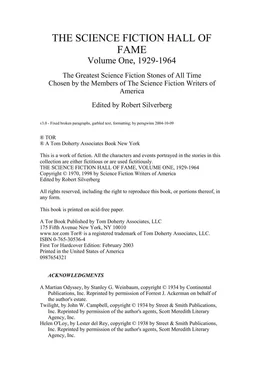June 4
letter to dr. strauss (copy) Dear Dr. Strauss:
Under separate cover I am sending you a copy of my report entitled, "The Algernon-Gordon Effect: A Study of Structure and Function of Increased Intelligence," which I would like to have you read and have published.
As you see, my experiments are completed. I have included in my report all of my formulae, as well as mathematical analysis in the appendix. Of course, these should be verified.
Because of its importance to both you and Dr. Nemur (and need I say to myself, too?) I have checked and rechecked my results a dozen times in the hope of finding an error. I am sorry to say the results must stand. Yet for the sake of science, I am grateful for the little bit that I here add to the knowledge of the function of the human mind and of the laws governing the artificial increase of human intelligence.
I recall your once saying to me that an experimental failure or the disproving of a theory was as important to the advancement of learning as a success would be. I know now that this is true. I am sorry, however, that my own contribution to the field must rest upon the ashes of the work of two men I regard so highly.
Yours truly, Charles Gordon end.: rept.
June 5 I must not become emotional. The facts and the results of my experiments are clear, and the more sensational aspects of my own rapid climb cannot obscure the fact that the tripling of intelligence by the surgical technique developed by Drs.
Strauss and Nemur must be viewed as having little or no practical applicability (at the present time) to the increase of human intelligence.
As I review the records and data on Algernon, I see that although he is still in his physical infancy, he has regressed mentally. Motor activity is impaired; there is a general reduction of glandular activity; there is an accelerated loss of coordination.
There are also strong indications of progressive amnesia.
As will be seen by my report, these and other physical and mental deterioration syndromes can be predicted with statistically significant results by the application of my formula.
The surgical stimulus to which we were both subjected has resulted in an intensification and acceleration of all mental processes. The unforeseen development, which I have taken the liberty of calling the Algernon-Gordon Effect, is the logical extention of the entire intelligence speed-up. The hypothesis here proven may be described simply in the following terms: Artificially increased intelligence deteriorates at a rate of time directly proportional to the quantity of the increase.
I feel that this, in itself, is an important discovery.
As long as I am able to write, I will continue to record my thoughts in these progress reports. It is one of my few pleasures. However, by all indications, my own mental deterioration will be very rapid.
I have already begun to notice signs of emotional instability and forgetfulness, the first symptoms of the burnout.
June 10 Deterioration progressing. I have become absentminded. Algernon died two days ago. Dissection shows my predictions were right. His brain had decreased in weight and there was a general smoothing out of cerebral convolutions as well as a deepening and broadening of brain fissures.
I guess the same thing is or will soon be happening to me. Now that it's definite, I don't want it to happen.
I put Algernon's body in a cheese box and buried him in the back yard. I cried.
June 15 Dr. Strauss came to see me again. I wouldn't open the door and I told him to go away. I want to be left to myself. I have become touchy and irritable. I feel the darkness closing in. It's hard to throw off thoughts of suicide. I keep telling myself how important this introspective journal will be.
It's a strange sensation to pick up a book that you've read and enjoyed just a few months ago and discover that you don't remember it. I remembered how great I thought John Milton was, but when I picked up Paradise Lost I couldn't understand it at all. I got so angry I threw the book across the room.
I've got to try to hold on to some of it. Some of the things I've learned. Oh, God, please don't take it all away.
June 19 Sometimes, at night, I go out for a walk. Last night I couldn't remember where I lived. A policeman took me home. I have the strange feeling that this has all happened to me before—a long time ago. I keep telling myself I'm the only person in the world who can describe what's happening to me.
June 21 Why can't I remember? I've got to fight. I lie in bed for days and I don't know who or where I am. Then it all comes back to me in a flash. Fugues of amnesia. Symptoms of senility—second childhood. I c&n watch them coming on.
It's so cruelly logical. I learned so much and so fast. Now my mind is deteriorating rapidly. I won't let it happen. I'll fight it. I can't help thinking of the boy in the restaurant, the blank expression, the silly smile, the people laughing at him. No—
please— not that again ...
June 22 I'm forgetting things that I learned recently. It seems to be following the classic pattern—the last things learned are the first things forgotten. Or is that the pattern? I'd better look it up again....
I reread my paper on the Algernon-Gordon Effect and I get the strange feeling that it was written by someone else. There are parts I don't even understand.
Motor activity impaired. I keep tripping over things, and it becomes increasingly difficult to type.
June 23 I've given up using the typewriter completely. My coordination is bad. I feel that I'm moving slower and slower. Had a terrible shock today. I picked up a copy of an article I used in my research, Krueger's Uber psychische Ganzheit, to see if it would help me understand what I had done. First I thought there was something wrong with my eyes. Then I realized I could no longer read German. I tested myself in other languages. All gone.
June 30 A week since I dared to write again. It's slipping away like sand through my fingers. Most of the books I have are too hard for me now. I get angry with them because I know that I read and understood them just a few weeks ago.
I keep telling myself I must keep writing these reports so that somebody will know what is happening to me. But it gets harder to form the words and remember spellings. I have to look up even simple words in the dictionary now and it makes me impatient with myself.
Dr. Strauss comes around almost every day, but I told him I wouldn't see or speak to anybody. He feels guilty. They all do. But I don't blame anyone. I knew what might happen. But how it hurts.
July 7 I don't know where the week went. Todays Sunday I know because I can see through my window people going to church. I think I stayed in bed all week but I remember Mrs Flynn bringing food to me a few times. I keep saying over and over Ive got to do something but then I forget or maybe its just easier not to do what I say Im going to do.
I think of my mother and father a lot these days. I found a picture of them with me taken at a beach. My father has a big ball under his arm and my mother is holding me by the hand. I dont remember them the way they are in the picture. All I remember is my father drunk most o the time and arguing with mom about money.
He never shaved much and he used to scratch my face when h
July 10 My landlady Mrs Flynn is very worried about me. She says the way I lay around all day and dont do anything I remind her of her son before she threw him out of the house. She said she doesnt like loafers. If 1m sick its one thing, but if Im a loafer mats another thing and she wont have it. I told her I think Im sick.
I try to read a little bit every day, mostly stories, but sometimes I have to read the same thing over and over again because I dont know what it means. And its hard to write. I know I should look up all the words in the dictionary but its so hard and Im so tired all the time.
Читать дальше












